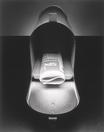

plagiarism n 1: a piece of writing that
has been copied from someone else and is presented as being your
own work
Plagiarism is a serious offense, a practice we must all avoid, and unfortunately, it's sometimes difficult to realize that we're even doing it. It is a violation of copyright laws, and it is a violation of good journalism. To plagiarize is to lose credibility. If you fool your reader once, you lose that reader's trust forever.
Who is a plagiarist? The student who leads her/his readers to believe that what he/she is reading is the original work of the student's when it is not.
This means that you MUST credit the source of your information whenever you are using their words or their main ideas. If you are not sure whether or not to credit a source of information, just do it! Always use the author's name, and also use the title and the publication (web site name, magazine or newspaper name) the first time you refer to the source.
Of course, you should NEVER create a story that doesn't exist or make up information and use it. Learn from the story of Janet Cooke. Read excerpts of the story that made her infamous. "Jimmy's World" excerpts
Though we are writing for a teenage
audience, we will be published on the WorldWideWeb for all to
see. We will act professionally and in accordance with the recognized
journalism standards and ethics.